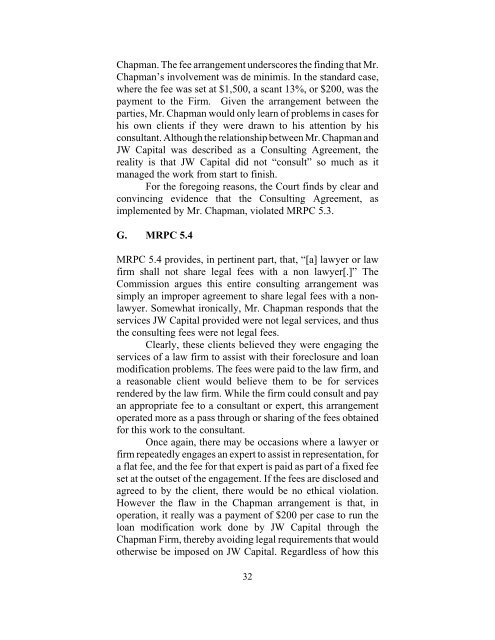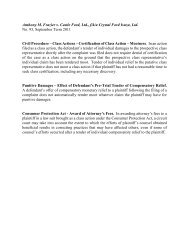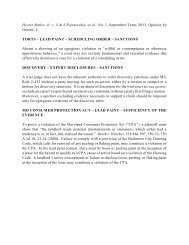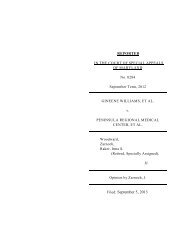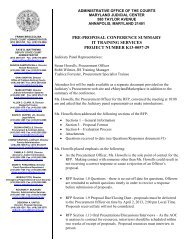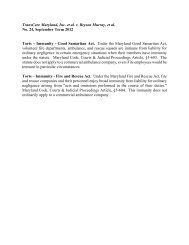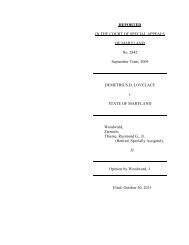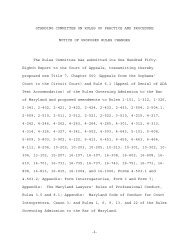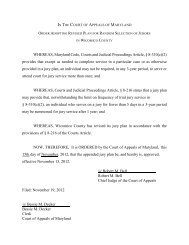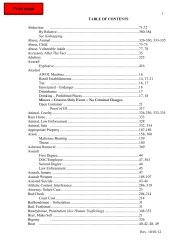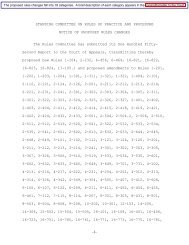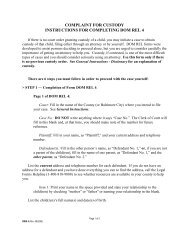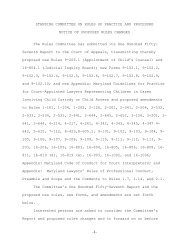44ag/11 - Maryland Courts
44ag/11 - Maryland Courts
44ag/11 - Maryland Courts
Create successful ePaper yourself
Turn your PDF publications into a flip-book with our unique Google optimized e-Paper software.
Chapman. The fee arrangement underscores the finding that Mr.<br />
Chapman’s involvement was de minimis. In the standard case,<br />
where the fee was set at $1,500, a scant 13%, or $200, was the<br />
payment to the Firm. Given the arrangement between the<br />
parties, Mr. Chapman would only learn of problems in cases for<br />
his own clients if they were drawn to his attention by his<br />
consultant. Although the relationship between Mr. Chapman and<br />
JW Capital was described as a Consulting Agreement, the<br />
reality is that JW Capital did not “consult” so much as it<br />
managed the work from start to finish.<br />
For the foregoing reasons, the Court finds by clear and<br />
convincing evidence that the Consulting Agreement, as<br />
implemented by Mr. Chapman, violated MRPC 5.3.<br />
G. MRPC 5.4<br />
MRPC 5.4 provides, in pertinent part, that, “[a] lawyer or law<br />
firm shall not share legal fees with a non lawyer[.]” The<br />
Commission argues this entire consulting arrangement was<br />
simply an improper agreement to share legal fees with a nonlawyer.<br />
Somewhat ironically, Mr. Chapman responds that the<br />
services JW Capital provided were not legal services, and thus<br />
the consulting fees were not legal fees.<br />
Clearly, these clients believed they were engaging the<br />
services of a law firm to assist with their foreclosure and loan<br />
modification problems. The fees were paid to the law firm, and<br />
a reasonable client would believe them to be for services<br />
rendered by the law firm. While the firm could consult and pay<br />
an appropriate fee to a consultant or expert, this arrangement<br />
operated more as a pass through or sharing of the fees obtained<br />
for this work to the consultant.<br />
Once again, there may be occasions where a lawyer or<br />
firm repeatedly engages an expert to assist in representation, for<br />
a flat fee, and the fee for that expert is paid as part of a fixed fee<br />
set at the outset of the engagement. If the fees are disclosed and<br />
agreed to by the client, there would be no ethical violation.<br />
However the flaw in the Chapman arrangement is that, in<br />
operation, it really was a payment of $200 per case to run the<br />
loan modification work done by JW Capital through the<br />
Chapman Firm, thereby avoiding legal requirements that would<br />
otherwise be imposed on JW Capital. Regardless of how this<br />
32


